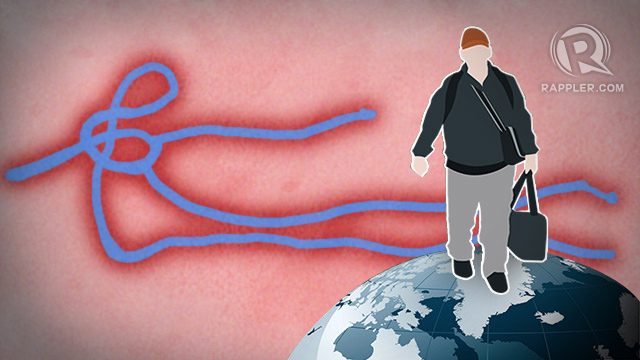SUMMARY
This is AI generated summarization, which may have errors. For context, always refer to the full article.

MANILA, Philippines – The Department of Health (DOH) said on Friday, August 8, it already cleared 13 out of 15 overseas Filipino workers (OFWs) who recently came home from Sierra Leone – one of the West African countries hit by an Ebola outbreak.
“[What was] last reported was dalawa na lang yung hindi cleared, so okay naman yun. I think the two will also be cleared kasi they would have exhibited symptoms na as of this time,” Health Undersecretary Ted Herbosa told reporters Friday.
(What was last reported was that only two OFWs have not been cleared, so that’s okay. I think the two will also be cleared since they would have already exhibited symptoms as of this time.)
The 15 OFWs who were repatriated by their recruitment agency arrived in the country between June 26 and July 15.
While the incubation period between exposure to the Ebola virus and the first symptoms is from two to 21 days, DOH extended its monitoring to a month.
Health spokesperson Lyndon Lee Suy earlier said 3 out of the 15 OFWs had fever – one of the symptoms of Ebola – but they eventually tested negative for the deadly virus.
The incubation period for the remaining two OFWs will end soon, Herbosa said.
The Ebola virus can be transmitted through bodily fluids, causing severe fever, muscle pain, weakness, vomiting, and diarrhea. In some cases, it also causes organ failure and unstoppable bleeding. It can kill victims in just days. (READ: Fast Facts: Ebola)
As of August 4, the World Health Organization (WHO) said there have been 1,711 cases of Ebola and 932 deaths in the 4 West African countries of Guinea, Liberia, Nigeria and Sierra Leone.
WHO on Friday already declared the Ebola outbreak a “public health emergency of international concern.”
Preventive measures
Herbosa said DOH has been keeping its eye on Ebola since 2013. (READ: TIMELINE: Ebola, a ruthless killer)
“Alam namin how it spreads: by contact with body fluids. That’s the difference between what is contagious and what is infectious. Contagious siya by contact – kailangan mahawakan mo. Usually they [patients] are contagious kapag nasa severe na sila nung illness nila,” he added.
(We know how it spreads: by contact with body fluids. That’s the difference between what is contagious and what is infectious. It is contagious by contact – you need to touch [the patient]. Usually they are contagious only when their illness is already severe.)
Luckily, Herbosa said, Ebola patients who are already considered severe no longer travel to another country since their health no longer permits it. This prevents the further spread of the disease.
Herbosa also explained that Ebola is usually transmitted to 3 types of people:
- Relatives who take care of the patient
- Nurses who are not trained to properly handle and treat patients
- People who handle the corpse of an Ebola patient without proper protection
Herbosa reiterated on Friday that the Philippines has “the processes to control it [Ebola].” (READ: Ona: Philippines ready for Ebola)
Health Secretary Enrique Ona earlier said the Research Institute for Tropical Medicine and other government hospitals have “enough” capacity to do laboratory tests for possible Ebola cases in the country. (READ: RITM on top of preparations for possible Ebola cases)
Philippine airports already have thermal scanners to detect arriving passengers with fever. Passengers are also asked to fill up a health checklist upon arrival in the country.
The Department of Foreign Affairs (DFA) already raised crisis alert level 2 in Guinea, Liberia, and Sierra Leone, instructing Filipinos to “restrict non-essential movements, avoid public places, and take extra precautions.”
This also means the country will allow only OFWs with existing employment contracts to go to these countries; deployment of workers with new contracts remains suspended.
The Philippine Overseas Employment Administration (POEA) is also doing weekly monitoring of OFWs currently deployed in the Ebola-hit West African countries.
POEA records show there are more than 600 Filipino workers in 3 of these countries:
- Guinea – 72
- Sierra Leone – 398
- Liberia – 202
Herbosa noted that most of these OFWs work for humanitarian organizations like UN and Doctors Without Borders.
“I’m assured they are also well-informed by their employers on how to protect themselves,” he added. – Rappler.com
Add a comment
How does this make you feel?
There are no comments yet. Add your comment to start the conversation.